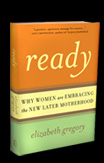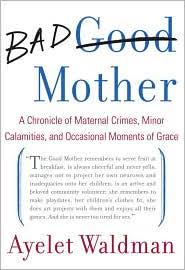 One of the things I like most about blogging is that your subject can change as you do. This summer I’ve been blogging pregnancy, and now, with just a few weeks more to go, and to keep up with the changes going on here at GWP, I’m changing the theme to (drum roll) Mama w/Pen. From here on in, keep an eye out for monthly contributions from me on the topic of emergent motherhood, feminist and otherwise, on the first Monday of each month.
One of the things I like most about blogging is that your subject can change as you do. This summer I’ve been blogging pregnancy, and now, with just a few weeks more to go, and to keep up with the changes going on here at GWP, I’m changing the theme to (drum roll) Mama w/Pen. From here on in, keep an eye out for monthly contributions from me on the topic of emergent motherhood, feminist and otherwise, on the first Monday of each month.
And speaking of becoming a mama, I just put an “away†message on my email, in preparation for The Big Event. In the meantime, you’ve not heard much from me this past month because I’ve been either in the hospital or on bedrest, spending much of my time lying on my side (best for babies’ circulation for some reason)—all of which makes it rather difficult to type on anything but an iPhone.
What started as a very cutting edge pregnancy—all those high-tech fertility interventions!—has ended up an anachronism. I now understand, in a very personal way, why pregnancy was once called “confinement,†or “lying in.†Hospitalized for early contractions at 30 weeks, I’ve spent the past 3.5 flat on my side, holed up with Marco, Tula (pictured here), my parents for a little while, and the occasional intrepid visitor from Manhattan and beyond. While Tula thinks bedrest is the cat’s meow, for me, it hasn’t been easy. Never in my life have I felt so limited by my body. I’m a a 21st century woman on a 19th century cure.
There are days when I think, “I can’t believe women, everyday, everywhere, go through this kind of thing, have gone through this, from the beginning of time.†Intelligent design? I think not. There are days when I’m in awe of my sisters who bear pregnancy gracefully, stoically, and without complication. Granted, some pregnancies are easier than others. For me, all attempts at grace and stoicism went out the window with those early contractions, which seem to only intensify as the weeks go by. My knees buckle from the weight of me. I have dark, dark circles under my eyes.
But I’m trying not to complain. Or rather, at least not in public, not out loud. I still can’t believe the technology worked. I’m still in awe that at ages 40 and 48, we’re lucky enough to become first time parents, and that we’re having not just one but two.
So rather than kvetch, which I confess is indeed my inclination right now, I’m trying instead to embrace the absurdity of it all while I bide my time and courageously hope not to give birth for a few weeks more—even though I’m more than ready to be done. Though it’s become increasingly hard to breath, there have been moments of buckling laughter. Like the night Marco wheeled me in a wheelchair with no leg support to the church down the block where Kol Nidre services were being held. Like the other day, when Marco walked me over to stand in front of the full-length mirror. “See? You’re still hot,†he said. “In a funhouse mirror kind of way.â€
Funhouse aside, I feel like a character from a Margaret Atwood novel—an incubator and not much else. “Having children is sacrifice,†says Shari, one of the kind nurses I see regularly when I go to the hospital for my twice weekly monitoring appointments to check on the status of my contractions and the babies’ heart rates. “It starts right here, right now.†But what about the incubator? I want to ask, incredulous that becoming a mother has to involve such prolonged discomfort and pain. Instead, I hold my tongue, think of my roommate during my stay at the hospital, who gave birth to twin boys at 26 weeks, and feel immensely grateful to be here, with babies still inside me, at week 34.







 If I could think of a topic that travels around the conversations of most women I know, the choice to have a child, and when, often lives pretty near the top of the list. Following it comes a litany of concerns: how to juggle career, partnerhood, personal and professional ambitions, and more.Â
If I could think of a topic that travels around the conversations of most women I know, the choice to have a child, and when, often lives pretty near the top of the list. Following it comes a litany of concerns: how to juggle career, partnerhood, personal and professional ambitions, and more.  PEACE.
PEACE. As we celebrated Women’s Equality Day* yesterday, we want to talk about one of the most enduring signs of the gender equality gap — the differences in how men and women spend their time on an everyday basis. Many of you have probably heard of the term the “double-shift†when talking about women’s work outside and inside the home, and anecdotally, we all have examples (“I came home from a 12 hour work day and had to pick up his socks.†Or “After work I had to pick up the kids, clean the house, and cook dinner.â€) The
As we celebrated Women’s Equality Day* yesterday, we want to talk about one of the most enduring signs of the gender equality gap — the differences in how men and women spend their time on an everyday basis. Many of you have probably heard of the term the “double-shift†when talking about women’s work outside and inside the home, and anecdotally, we all have examples (“I came home from a 12 hour work day and had to pick up his socks.†Or “After work I had to pick up the kids, clean the house, and cook dinner.â€) The  This here post comes straight from dear friend of GWP and mine, and fellow writer,
This here post comes straight from dear friend of GWP and mine, and fellow writer,  For Grandma Marge (may her memory be for a blessing)
For Grandma Marge (may her memory be for a blessing) It was recently pointed out to me by my dear observant friend
It was recently pointed out to me by my dear observant friend  I’ve been so busy during this pregnancy either a) puking or b) helping start a
I’ve been so busy during this pregnancy either a) puking or b) helping start a 